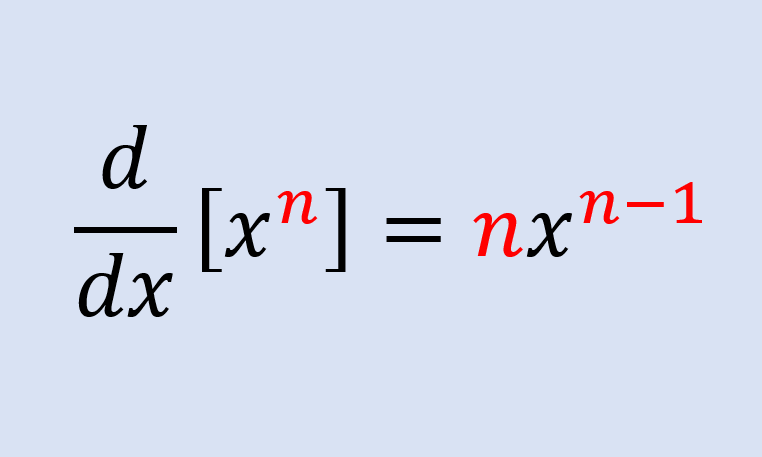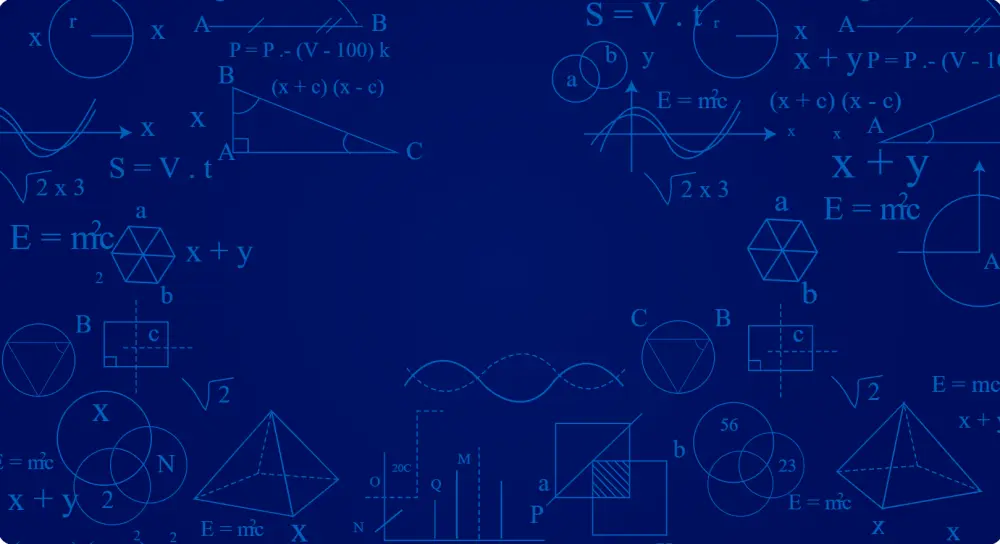The power rule of derivatives allows us to find the derivative of a function in a simpler way than when we use limits. The power rule is mainly used when we have variables raised to a numerical exponent, like $latex x^2, ~x^{-5}, ~x^{\frac{1}{2}}$, etc.
Here, we will solve 10 examples of derivatives by using the power rule. Additionally, we will explore 5 problems to practice the application of this rule.
10 Examples with answers of the power rule of derivatives
Each of the following examples has its respective solution, where we apply the power rule to find the derivatives of the given functions.
EXAMPLE 1
Find the derivative of $latex f(x)=x^4$.
Solution
We start by writing the formula for the power rule:
$latex f'(x^n) = nx^{n-1}$
In this case, we have the exponent $latex n=4$. Then, by using the power rule, we have:
$$\frac{d}{dx} (x^n) = \frac{d}{dx} (x^4)$$
$$\frac{d}{dx} (x^4) = 4 \cdot x^{4-1}$$
Simplifying this, we have:
$$\frac{d}{dx} (x^4) = 4 x^3$$
$$f'(x)= 4 x^3$$
EXAMPLE 2
What is the derivative of the function $latex f(x)=4x^3$?
Solution
Let’s solve using the formula for the power rule of derivatives:
$latex f'(x^n) = nx^{n-1}$
We can identify the exponent $latex n=3$. Then, by applying the power rule, we have:
$$\frac{d}{dx} (x^n) = \frac{d}{dx} (x^3)$$
$$\frac{d}{dx} (4x^3) = 3 \cdot (4x^{3-1})$$
When we simplify the expression, we have:
$$\frac{d}{dx} (4x^3) = 12 x^2$$
$$f'(x)= 12 x^2$$
EXAMPLE 3
Find the derivative of the function $latex f(x)=7x^8$.
Solution
The formula for the power rule of derivatives is:
$latex f'(x^n) = nx^{n-1}$
In this case, we have the exponent $latex n=8$. Applying the power rule, we have:
$$\frac{d}{dx} (x^n) = \frac{d}{dx} (7x^8)$$
$$\frac{d}{dx} (7x^8) = 8 \cdot (7x^{8-1})$$
When we simplify this expression, we have:
$$\frac{d}{dx} (7x^8) = 56 x^7$$
$$f'(x)= 56 x^7$$
EXAMPLE 4
Find the derivative of the function $latex f(x)=3x^{-5}$.
Solution
We start by writing the formula for the power rule:
$latex f'(x^n) = nx^{n-1}$
In this case, we have a negative exponent $latex n=-5$. However, we simply have to apply the power rule as in the previous cases:
$$\frac{d}{dx} (x^n) = \frac{d}{dx} (3x^{-5})$$
$$\frac{d}{dx} (3x^{-5}) = -5 \cdot (3x^{-5-1})$$
When we simplify the expression, we have:
$$\frac{d}{dx} (3x^{-5}) = -15 x^{-6}$$
$$f'(x)= -15 x^{-6}$$
We can use the laws of exponents to write as follows:
$$f'(x) = -\frac{15}{x^6}$$
EXAMPLE 5
What is the derivative of the function $latex f(x)=-5x^{-6}$?
Solution
Let’s use the power rule of derivatives:
$latex f'(x^n) = nx^{n-1}$
We see that the exponent is $latex n=-6$. Therefore, using the power rule with this function, we have:
$$\frac{d}{dx} (x^n) = \frac{d}{dx} (-5x^{-6})$$
$$\frac{d}{dx} (-5x^{-6}) = -6 \cdot (-5x^{-6-1})$$
When we simplify, we have:
$$\frac{d}{dx} (-5x^{-6}) = 30 x^{-7}$$
$$f'(x)= 30 x^{-7}$$
We can write as follows for simplicity:
$$f'(x) = \frac{30}{x^7}$$
EXAMPLE 6
What is the derivative of $latex f(x)=\frac{1}{x^5}$?
Solution
The formula for the power rule is:
$latex f'(x^n) = nx^{n-1}$
In this case, we have a variable in the denominator. Therefore, we can use the rules of exponents to write as follows:
$latex f(x)=x^{-5}$
Then, we see that we have the exponent $latex n=-5$. Using the power rule, we have:
$$\frac{d}{dx} (x^n) = \frac{d}{dx} (x^{-5})$$
$$\frac{d}{dx} (x^{-5}) = -5 \cdot x^{-5-1}$$
Simplifying this, we have:
$$\frac{d}{dx} (x^{-5}) = -5 x^{-6}$$
$$f'(x)= -5 x^{-6}$$
We use the rules of exponents again to write as follows:
$$f'(x) = -\frac{5}{x^6}$$
EXAMPLE 7
Determine the derivative of $latex f(x)=\frac{2}{3x^2}$.
Solution
We start by writing the formula for the power rule:
$latex f'(x^n) = nx^{n-1}$
We use the rules of exponents to write like this:
$latex f(x)=\frac{2}{3} x^{-2}$
Now, we have the exponent $latex n=-2$. Using the power rule, we have:
$$\frac{d}{dx} (x^n) = \frac{d}{dx} (\frac{2}{3} x^{-2})$$
$$\frac{d}{dx} (\frac{2}{3} x^{-2}) = -2 \cdot (\frac{2}{3} x^{-2-1})$$
Simplifying this, we have:
$$\frac{d}{dx} (\frac{2}{3} x^{-2}) = -\frac{4}{3} x^{-3}$$
$$f'(x)= -\frac{4}{3} x^{-3}$$
Finally, we can write as follows:
$$f'(x)= -\frac{4}{3x^3}$$
EXAMPLE 8
Find the derivative of the function $latex f(x)=x^{\frac{1}{3}}$
Solution
The power rule of derivatives is:
$latex f'(x^n) = nx^{n-1}$
In this case, we have the exponent $latex n=\frac{1}{3}$. When we use the power rule, we have:
$$\frac{d}{dx} (x^n) = \frac{d}{dx} (x^{\frac{1}{3}})$$
$$\frac{d}{dx} (x^{\frac{1}{3}}) = \frac{1}{3} \cdot (x^{\frac{1}{3}-1})$$
Simplifying this, we have:
$$\frac{d}{dx} (x^{\frac{1}{3}}) = \frac{1}{3} x^{-\frac{2}{3}}$$
$$f'(x)= \frac{1}{3} x^{-\frac{2}{3}}$$
Using the rules of exponents, we can write as follows:
$$f'(x)= \frac{1}{3 x^{\frac{2}{3}}}$$
$$f'(x)= \frac{1}{3 \sqrt[3]{x^2}}$$
EXAMPLE 9
Find the derivative of $latex f(x)=\sqrt{x}$.
Solution
We have the following rule:
$latex f'(x^n) = nx^{n-1}$
We can use the rules of exponents to rewrite the radical:
$$ \sqrt{x}=x^{\frac{1}{2}}$$
Now, we see that the exponent is $latex n = \frac{1}{2}$. Then, using the power rule on the function, we have:
$$\frac{d}{dx} (x^n) = \frac{d}{dx} (x^{\frac{1}{2}})$$
$$\frac{d}{dx} (x^{\frac{1}{2}}) = \frac{1}{2} \cdot ( x^{\frac{1}{2}-1})$$
Simplifying, we have:
$$f'(x) = \frac{1}{2} x^{-\frac{1}{2}}$$
Using the rules of exponents, we write as follows:
$$f'(x) = \frac{1}{2x^{\frac{1}{2}}}$$
$$f'(x) = \frac{1}{2\sqrt{x}}$$
EXAMPLE 10
Find the derivative of $latex f(x)=\frac{1}{\sqrt{x}}$.
Solution
We have the following rule:
$latex f'(x^n) = nx^{n-1}$
We use the rules of exponents to write the function like this:
$$ \frac{1}{\sqrt{x}}=x^{-\frac{1}{2}}$$
The exponent of the function is $latex n = -\frac{1}{2}$. Therefore, by applying the power rule of derivatives on the function, we have:
$$\frac{d}{dx} (x^n) = \frac{d}{dx} (x^{-\frac{1}{2}})$$
$$\frac{d}{dx} (x^{-\frac{1}{2}}) = -\frac{1}{2} \cdot ( x^{-\frac{1}{2}-1})$$
Simplifying, we have:
$$f'(x) = -\frac{1}{2} x^{-\frac{3}{2}}$$
We can use the rules of exponents again to write:
$$f'(x) = -\frac{1}{2x^{\frac{3}{2}}}$$
$$f'(x) = -\frac{1}{2\sqrt{x^3}}$$
5 Practice problems of the power rule of derivatives
Apply the power rule to find the derivatives of the following functions.
See also
Interested in learning more about derivatives of functions? You can take a look at these pages:




